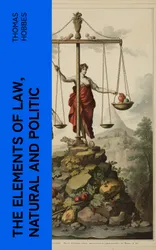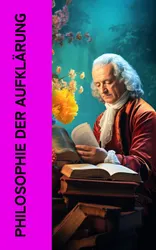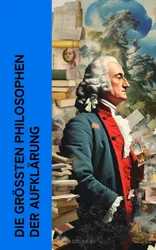In "The Elements of Law, Natural and Politic," Thomas Hobbes explores the foundation of political philosophy through a meticulous examination of human nature, morality, and the structure of society. Written in a clear yet intricate style, this treatise unpacks the social contract theory, laying the groundwork for modern political thought. Hobbes employs a rationalist approach, interweaving his insights into natural law with an analysis of governance, ultimately arguing for the necessity of a powerful sovereign to maintain order and prevent conflict among self-interested individuals. This work is situated within the broader context of 17th-century Enlightenment thinking, reflecting the tumultuous political landscape of his time, particularly the English Civil War. Thomas Hobbes, an influential philosopher, was deeply affected by the chaos of his era, which instilled in him a profound distrust of human nature and a recognition of the inherent violence in humanity's quest for survival. His early experiences, particularly witnessing the breakdown of social order, galvanized his thoughts on the need for strong political authority. As a student of Aristotle's works, Hobbes melded classical philosophy with emerging Enlightenment ideals, which undoubtedly informed his vision in "The Elements of Law." This seminal work is a must-read for scholars of political theory and philosophy. Hobbes's incisive insights into the human condition and the nature of power provide a thought-provoking framework for understanding contemporary political discourse. Readers will find themselves challenged to reflect on the balance between individual liberty and social stability, making this book a timeless addition to any intellectual library.

Leviathan
Thomas Hobbes
audiobookbook
The Elements of Law, Natural and Politic
Thomas Hobbes
book
Harvard's Classics Collection: Complete 71 Volumes : The Five Foot Shelf & The Shelf of Fiction - The Classic Literature & The Greatest Works of Fiction from Antics to Modern Age
Johann Wolfgang von Goethe, Gotthold Ephraim Lessing, Bjørnstjerne Bjørnson, Thomas Carlyle, Theodor Storm, Plato, Theodor Fontane, René Descartes, Gottfried Keller, Mark Twain, Immanuel Kant, Charles Darwin, Martin Luther, Robert Louis Stevenson, William Shakespeare, Dante Alighieri, Euripides, Percy Bysshe Shelley, Charles Lamb, Henry David Thoreau, Henry James, Samuel Johnson, John Stuart Mill, Victor Hugo, David Hume, Joseph Addison, Jane Austen, John Locke, John Fletcher, Francis Beaumont, Leigh Hunt, Epictetus, Alphonse Daudet, Thomas De Quincey, Guy de Maupassant, George Eliot, Walter Scott, Laurence Sterne, Samuel Taylor Coleridge, Jonathan Swift, Christopher Marlowe, Wilhelm Grimm, William Hazlitt, Marcus Tullius Cicero, Daniel Defoe, Aesop, Richard Henry Dana, Henry Fielding, John Dryden, Philip Massinger, Pedro Calderón de la Barca, Bret Harte, George Sand, John Ruskin, Oliver Wendell Holmes, Ernest Renan, Robert Burns, David Garrick, Ralph Waldo Emerson, John Webster, Washington Irving, Izaak Walton, John Bunyan, Juan Valera, Alfred de Musset, James Russell Lowell, Charles Augustin Sainte-Beuve, Nathaniel Hawthorne, Homer, Edmund Burke, Plutarch, Molière, Aeschylus, Michael Faraday, Sophocles, William Makepeace Thackeray, Benjamin Franklin, Edward Everett Hale, Pierre Corneille, Jean Racine, Voltaire, Robert Browning, Oliver Goldsmith, Thomas Dekker, John Milton, Aristophanes, Blaise Pascal, Virgil, Richard Brinsley Sheridan, Simon Newcomb, William Penn, Walter Bigges, Philip Sidney, Herodotus, Walter Raleigh, Francis Bacon, Giuseppe Mazzini, Francis Pretty, George Berkeley, Thomas Hobbes, Adam Smith, Alessandro Manzoni, Abraham Cowley, Michel de Montaigne, Ben Jonson, John Woolman, Benvenuto Cellini, Sydney Smith, Jean Froissart, William Henry Harrison, William Harvey, Marcus Aurelius, Hans Christian Andersen, Thomas Malory, George Gordon Byron, Thomas à Kempis, Ivan Turgenev, Richard Steele, Thomas Browne, Archibald Geikie, Thomas Babington Macaulay, Leo Tolstoy, Fyodor Dostoevsky, Tacitus, William Roper, Hippocrates, Miguel de Cervantes, Thomas More, Friedrich von Schiller, Philip Nichols, Louis Pasteur, Joseph Lister, Jean Jacques Rousseau, Pliny the Younger, Charles W. Eliot, Edgar Alan Poe, Saint Augustine, Hermann Ludwig Ferdinand von Helmholtz, Francis Drake, Edward Haies, Niccolo Machiavelli, Ambroise Paré, William A. Neilson, Honoré Balzac, Alexander L. Kielland
book
De la nature humaine
Thomas Hobbes
book
Leviathan
Thomas Hobbes
audiobookbook
Leviathan : Band 1-4: Politische Philosophie über Staat und Macht (Ausgabe in neuer Übersetzung und Rechtschreibung)
Thomas Hobbes
book
Leviathan : (The Matter Forme Power of a Common-Wealth Ecclesiastical And Civill)
Thomas Hobbes
book
Philosophie der Aufklärung : Die wichtigsten Werke von Immanuel Kant, John Locke, Rousseau, Voltaire, Denis Diderot, David Hume, Leibniz, Johann Gottfried Herder
Johann Gottfried Herder, Montesquieu, David Hume, Denis Diderot, Jean-Jacques Rousseau, John Locke, Thomas Hobbes, Benjamin Franklin, Francis Bacon, Immanuel Kant, Baruch Spinoza, Isaac Newton, Freiherr Gottfried Wilhelm von Leibniz, Voltaire, René Descartes
book
Die größten Philosophen der Aufklärung : Neues Organon, Kritik der reinen Vernunft, Der Gesellschaftsvertrag, Candide, Monadologie, Mathematische Principien der Naturlehre
Jean-Jacques Rousseau, Voltaire, Denis Diderot, David Hume, Johann Gottfried Herder, John Locke, Thomas Hobbes, Benjamin Franklin, Francis Bacon, Immanuel Kant, Montesquieu, Baruch Spinoza, Isaac Newton, Freiherr Gottfried Wilhelm von Leibniz, René Descartes
book
Grundzüge der Philosophie : Die unveränderliche menschliche Natur und die Notwendigkeit absoluter Autorität
Thomas Hobbes
book
The Political Works of Thomas Hobbes (4 Books in One Edition) : Leviathan, On the Citizen, The Elements of Law & Behemoth: The Long Parliament
Thomas Hobbes
book
Metaphysik: Zwischen flüchtiger Wahrheit und ewiger Suche : Meisterwerke der Philosophie: Metaphysische Anfangsgründe der Naturwissenschaft, Träume eines Geistersehers, Grundzüge der Philosophie, Götzen-Dämmerung
Platon, Aristoteles, Plotin, Thomas von Aquin, René Descartes, Baruch Spinoza, Thomas Hobbes, Immanuel Kant, Gottfried Wilhelm Leibniz, Friedrich Wilhelm Joseph Schelling, Georg Wilhelm Friedrich Hegel, Arthur Schopenhauer, Moses Mendelssohn, Friedrich Nietzsche, Rudolf Steiner
book
